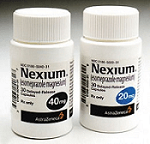 FDA actions against India's Ranbaxy Laboratories ostensibly are keeping U.S. consumers safer, but much poorer. The plant bans have also shined a spotlight on how complex drug laws in the U.S. can work against consumers' best interests.
FDA actions against India's Ranbaxy Laboratories ostensibly are keeping U.S. consumers safer, but much poorer. The plant bans have also shined a spotlight on how complex drug laws in the U.S. can work against consumers' best interests.
Bans of products coming out of four Ranbaxy plants that the agency says have faked data continue to keep the Indian generics maker from launching exclusive generics of three blockbusters, the latest being AstraZeneca's ($AZN) heartburn drug Nexium. It went off patent last month. And because U.S. law won't allow the FDA to just hand off that right, it is in turn preventing other versions from being released and so depriving payers of the deep discounts that would flow from those, amounts that are running to the billions of dollars at this point. Nexium sales in the U.S. were $2.12 billion last year.
The situation has uncovered a "flaw in the process," Everett Neville, with pharmacy-benefits manager Express Scripts ($ESRX), told The Wall Street Journal, expressing concern over what the delays are doing to the costs of U.S. healthcare. Columbia Law School professor Scott Hemphill, agrees. He says the generics traffic jam raises "a serious question over whether the rules are too complex to manage, or to anticipate strange, unusual and unfortunate consequences that result from them."
Nexium is the third drug for which a Ranbaxy generic has been delayed. Novartis' ($NVS) heart drug Diovan went off patent in September of 2012. Instead of seeing its sales of the drug plunge last year, the Swiss drugmaker earned $1.7 billion from it, according to the drugmaker's annual report. Roche's ($RHHBY) antiviral Valcyte has also escaped competition after going off patent last year. Roche doesn't break down U.S. sales but reported global revenues of $672 million last year, up 10%.
Ranbaxy, which agreed in April to a $3.2 billion buyout by India's Sun Pharmaceutical, is losing hundreds of millions of dollars in sales. Its execs have reportedly looked at other ways to deal with the situation, like buying the active pharmaceutical ingredient for Nexium from another supplier, since its plant which makes the API is among those the FDA has shunned. But then so is the plant that was expected to make it, which leaves Ranbaxy having to figure out how to finesse that situation.
But Ranbaxy is not the only drugmaker suffering from its plight. Other generic makers are also losing out as long as the exclusive launches are delayed. Generic drugmaker Mylan ($MYL) tried suing the FDA for the right to launch its own version of Diovan but a federal court threw the case out. A yet unidentified drugmaker has filed a citizen's petition over the entire mess.
In the case of Nexium, consumers have one option. The FDA in March approved an over-the-counter version of the purple pill, which Pfizer ($PFE) will sell, having bought the rights from AstraZeneca. The U.S. drugmaker started pre-orders in April and a nationwide launch of the OTC version May 27, the day prescription Nexium went off patent.
- read the WSJ story (sub. req.)